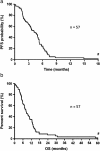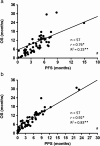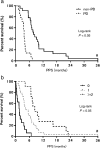Clinical impact of post-progression survival on overall survival in elderly patients with extensive disease small-cell lung cancer
- PMID: 27755823
- PMCID: PMC5093173
- DOI: 10.1111/1759-7714.12381
Clinical impact of post-progression survival on overall survival in elderly patients with extensive disease small-cell lung cancer
Abstract
Background: The effects of first-line chemotherapy on overall survival (OS) might be confounded by subsequent therapies in patients with small-cell lung cancer (SCLC). Therefore, the objective of our study was to determine the relationships between progression-free survival (PFS) or post-progression survival (PPS) and OS after first-line chemotherapy in elderly patients with extensive disease-SCLC (ED-SCLC), using individual level data.
Methods: Between July 1998 and December 2014, we analyzed 57 cases of elderly patients with ED-SCLC who were treated with carboplatin and etoposide as first-line chemotherapy. The relationships between PFS and PPS with OS were analyzed at an individual level.
Results: Spearman rank correlation and linear regression analyses showed that PPS was strongly correlated with OS (r = 0.92, P < 0.05, R 2 = 0.83) and PFS was moderately correlated with OS (r = 0.76, P < 0.05, R 2 = 0.25). The best response at second-line treatment and the number of regimens after progression beyond first-line chemotherapy were both significantly associated with PPS (P < 0.05).
Conclusions: PPS has a stronger impact on OS than PFS in elderly ED-SCLC patients after first-line chemotherapy. In addition, the response at second-line treatment and the number of additional regimens after first-line treatment are significant independent prognostic factors for PPS. These results suggest that OS in elderly ED-SCLC patients may be influenced by treatments subsequent to first-line chemotherapy; however, this remains to be verified with prospective studies.
Keywords: Elderly; extensive disease small-cell lung cancer; overall survival; post-progression survival; progression-free survival.
© 2016 The Authors. Thoracic Cancer published by China Lung Oncology Group and John Wiley & Sons Australia, Ltd.
Figures




Similar articles
-
Clinical Significance of the Relationship between Progression-Free Survival or Postprogression Survival and Overall Survival in Patients with Extensive Disease-Small-Cell Lung Cancer Treated with Carboplatin plus Etoposide.Can Respir J. 2016;2016:5405810. doi: 10.1155/2016/5405810. Epub 2016 Jun 29. Can Respir J. 2016. PMID: 27445549 Free PMC article.
-
The effect of post-progression survival on overall survival among patients with sensitive relapse of small cell lung cancer.Med Oncol. 2018 Mar 5;35(4):45. doi: 10.1007/s12032-018-1107-6. Med Oncol. 2018. PMID: 29508094
-
Post-progression survival after atezolizumab plus carboplatin and etoposide as first-line chemotherapy in small cell lung cancer has a significant impact on overall survival.Thorac Cancer. 2022 Oct;13(19):2776-2785. doi: 10.1111/1759-7714.14621. Epub 2022 Sep 5. Thorac Cancer. 2022. PMID: 36062426 Free PMC article.
-
Clinical significance of post-progression survival in lung cancer.Thorac Cancer. 2017 Sep;8(5):379-386. doi: 10.1111/1759-7714.12463. Epub 2017 Jun 19. Thorac Cancer. 2017. PMID: 28627767 Free PMC article. Review.
-
Comparison of First-Line Treatments for Patients With Extensive-Stage Small Cell Lung Cancer: A Systematic Review and Network Meta-analysis.JAMA Netw Open. 2020 Oct 1;3(10):e2015748. doi: 10.1001/jamanetworkopen.2020.15748. JAMA Netw Open. 2020. PMID: 33074323 Free PMC article.
Cited by
-
Real-world evaluation of second line chemotherapy for patients with advanced non-small cell lung cancer harboring preexisting interstitial lung disease.Invest New Drugs. 2022 Feb;40(1):182-189. doi: 10.1007/s10637-021-01162-x. Epub 2021 Aug 20. Invest New Drugs. 2022. PMID: 34415485
-
Real-world evaluation of carboplatin plus a weekly dose of nab-paclitaxel for patients with advanced non-small-cell lung cancer with interstitial lung disease.Cancer Manag Res. 2018 Dec 14;10:7013-7019. doi: 10.2147/CMAR.S189556. eCollection 2018. Cancer Manag Res. 2018. PMID: 30588105 Free PMC article.
-
Impact of subsequent chemotherapy on the survival of elderly patients with extensive stage small cell lung cancer.Korean J Intern Med. 2020 Nov;35(6):1468-1476. doi: 10.3904/kjim.2019.136. Epub 2020 Apr 29. Korean J Intern Med. 2020. PMID: 32336056 Free PMC article.
-
Efficacy and safety of carboplatin and etoposide in older extensive-stage small-cell lung cancer patients with a poor performance status.Thorac Cancer. 2023 Mar;14(9):805-814. doi: 10.1111/1759-7714.14811. Epub 2023 Jan 25. Thorac Cancer. 2023. PMID: 36700290 Free PMC article.
-
Amrubicin monotherapy for elderly patients with relapsed extensive-disease small-cell lung cancer: A retrospective study.Thorac Cancer. 2018 Oct;9(10):1279-1284. doi: 10.1111/1759-7714.12833. Epub 2018 Aug 20. Thorac Cancer. 2018. PMID: 30126051 Free PMC article.
References
-
- DeSantis CE, Lin CC, Mariotto AB et al. Cancer treatment and survivorship statistics, 2014. CA Cancer J Clin 2014; 64: 252–71. - PubMed
-
- National Cancer Institute at the National Institutes of Health . Small Cell Lung Cancer Treatment (PDQ) – Health Professional Version 2015.
-
- Johnson BE, Jänne PA. Basic treatment considerations using chemotherapy for patients with small cell lung cancer. Hematol Oncol Clin North Am 2004; 18: 309–22. - PubMed
-
- Demedts IK, Vermaelen KY, van Meerbeeck JP. Treatment of extensive‐stage small cell lung carcinoma: Current status and future prospects. Eur Respir J 2010; 35: 202–15. - PubMed
MeSH terms
Substances
LinkOut - more resources
Full Text Sources
Other Literature Sources
Medical

